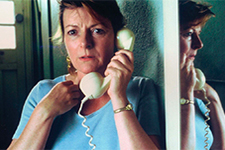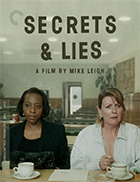Secrets & Lies
|  Mike Leigh’s Secrets & Lies, which won the Palm d’Or at the 1996 Cannes Film Festival, earned five Oscar nominations, and landed somewhere on just about every critic’s top ten list for that year, is a masterful dramedy about that wonderfully, terribly complex thing we call family. In its own unforced and unpretentious way, it manages to exam the nature of family interpersonally, biologically, and sociologically—in other words, in all the ways that family intersects with our very existence, shaping and defining us (or least how we think of ourselves). It is a simple story, really, about a woman who, having recently lost her adoptive mother, decides to seek out her birth mother and how that one act results in a cascading revelation of the “secrets and lies” of the title, all of which were held for defensible reasons, but whose revelation releases their holders from their weight and makes possible new understandings. It is a film about the fundamental importance of truth, something that we need today more than ever. Leigh, who developed the story and dialogue largely through lengthy rehearsals with his cast, builds the narrative around the intersecting stories of a middle-age sister and brother. The sister, Cynthia (Brenda Blethyn, who deservedly won the Best Actress award at Cannes), is a single mother who works at a cardboard box factory and lives a fairly miserable existence in an older, working-class neighborhood with her boorish, soon-to-be-21-year-old daughter, Roxanne (Claire Rushbrook). Roxanne clearly resents Cynthia and the life she is able to provide for them. Cynthia’s brother, Maurice (Timothy Spall), is a successful portrait and wedding photographer who is struggling in his marriage to Monica (Phyllis Logan), who has some kind of medical condition and seems to resent him in a manner similar to Roxanne’s resentment toward Cynthia. Meanwhile, we are introduced to Hortense (Marianne Jean-Baptiste), an optometrist who was adopted and decides to seek out her birth mother, who turns out to be Cynthia. Cynthia is at first incredulous when they meet and thinks that a mistake has been made because she is white and Hortense is black; but, in one of the film’s most memorably ambiguous moments, Cynthia clearly remembers what happened to bring Hortense into the world when she was only 16. Having been given up as a newborn, Hortense has no memory of her birth mother, and Cynthia has kept the event a secret from just about everyone, including Roxanne. Cynthia and Hortense strike up a friendship, which leads Cynthia to invite Hortense to Roxanne’s 21st birthday party at Maurice and Monica’s house, a decision that is all but assured to lead to an outpouring of long sequestered revelations that will fundamentally redefine how everyone understands everyone else. Leigh and his cast do a marvelous job of breathing life into the film’s characters, which represent a broad range of types, but all share in common certain characteristics, notably their hidden shame and their desire for something that may very well be just out of their reach. Much of their behavior in the film is not fully explained until the third act, notably the tension in the marriage between Maurice and Monica. Monica, in particular, appears to be both callous in her treatment of Maurice and shallow in her adulation of their home, which she proudly shows off to everyone at the party (at one point she goes on about the calming color in one of the bathrooms and even shows them the linen closet). Similarly, the tension between Monica and Cynthia comes into better focus once long-held secrets are revealed, as does Maurice’s doting on Roxanne, who otherwise seems to be a fairly unpleasant character. Yet, as with the others, what we see on the surface for much of the film is just that—a surface—under which is roiling much more than we may have initially realized. Leigh began his career as a theatre director in the 1960s, and he moved into the world of film first via television plays in the 1970s and ’80s. His first theatrical feature, High Hopes (1988), was about a working-class family and helped to establish many of the thematic and aesthetic characteristics that would come to define his work over the next several decades. In Secrets & Lies, he and his frequent cinematographer Dick Pope (Life is Sweet, Topsy-Turvy, Mr. Turner) frequently leave the camera static, which allows our focus to rest entirely on the characters and their interactions and behaviors, both broad and subtle. This is perhaps nowhere more powerfully utilized than in the café scene after Cynthia and Hortense first meet. For a significant period of time, the camera remains unblinking and unmoving in a medium shot of the two women sitting on the same side of the table engaging in awkward conversation. They mostly look forward, rather than at each other, which allows us to see every nuance of their facial expressions and underscores their discomfort. It is during this scene that Cynthia recovers the long-buried memory of Hortense’s conception (which we read entirely off her face and voice, as she never actually articulates it), and it is also during this scene that we begin to sense that perhaps these two women, so different and yet so closely related, might have some kind of future together. And it is that sense of hope that really carries Secrets & Lies forward. Leigh is often tagged as a pessimist, partially because so many of his film are about the persistence of class and social conflict. Yet, here he allows for his characters to bridge their various divides and come together in ways that might have seemed impossible at the beginning of the film. It is easily Leigh’s most hopeful film, which is perhaps why it has endured as one of his most broadly popular, but that hope never feels false or forced or sentimental or naïve. Instead, Leigh and his cast find a perfectly balanced place between the realities of family messiness and our fundamental desire to connect and understand each other.
Copyright © 2021 James Kendrick Thoughts? E-mail James Kendrick All images copyright © The Criterion Collection | |||||||||||||||||||||||||||||
Overall Rating: 


 (4)
(4)


